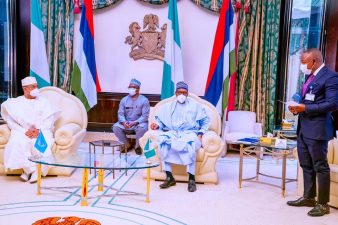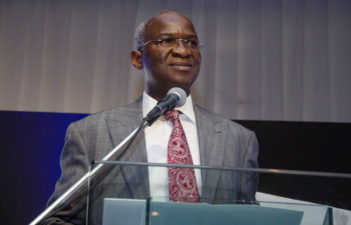Being an opening remark by His Eminence Dr. Muhammad Sa’ad Abubakar, CFR, mni, the Sultan of Sokoto and President General of Nigerian Supreme Council for Islamic Affairs (NSCIA) at the NIREC meeting held at Bodija, Ibadan, on Thursday, June 23, 2022 as Co-Chairman of NIREC.
Let me first express our profound gratitude for Allah’s mercies and grace for allowing us to hold this meeting in these times of great anxiety. Let me then welcome each and every one of you for this important meeting on a very important theme of promoting mutual love and understanding in Nigeria. Indeed this country is in great need of mutual love and understanding, being increasingly consumed by all manners of conflicts. And NIREC is perhaps the most appropriate platform to pursue this, bringing together as it does, the top most religious leadership of the two major faiths in the country.
It is true that this country is both ethnically and religiously diverse. But diversity in itself and by itself should not be a problem at all. If anything diversity has always been a source of strength. It is enough pointer that nature itself is diverse and in agriculture mono-cultures are weak, the strength of the land is in its diversity and it is diversity that gives the land its productivity and the ecosystem its sustainability.
So also in human societies; homogenous societies like Somalia are symbols of state failures. On the other hand, some of the greatest countries are also some of the most diverse, so diversity cannot be the problem, rather our management of our diversity has not been good enough as to strengthen that mutual love and social fabric that holds nations together. This should settle the contestation over diversity and allow us to focus on the real issue, our management of our diversity.
One of the most potent diversities is religion. But the good thing is that these religions are all from One God, and coming from one source share a lot of the fundamentals. Both Islam and Christianity recognize and defer to God and both recognize the temporariness of the life of this world and that ultimately we all go back to God for the day of reckoning when everybody will render an account of his life on this temporary abode.
The essence of religion is to guide us to ensure that we navigate our lives here on earth in such a way as to return to heavens. That there will be consequences and that there is no escape from God’s judgement should ought to tame our behavior and it is the job of religious men and women, the ulama and clergy to constantly remind us of this reality.
More importantly is the fact that religion is built on love and in Islam this is also fundamental though not sufficiently explained. One of our associates, a promoter of mutual love and respect, HRH Prince Ghazi bin Muhammad, recently published his PhD thesis on the topic of ‘Love in the Qur’an” done in the great University of Al-Azhar. It is important to reflect on this great book and its message.
In the book, he reminded us that Allah is Al-Rahman, the Compassionate and Al-Rahim the Merciful, but he is also Al-Wudud the Loving one. His creation of mankind and his abode and the rest of the universe are acts of love out of which flows His compassion and mercy. He instructed us to show compassion and mercy between spouses as well as within the family and he instructed us to show compassion and mercy to the rest of mankind.
He specifically said in the words of His Prophet, Muhammad (SAW) that He Allah will not show mercy to any human being who has not shown mercy to his fellow human beings.
The message of both Islam and Christianity in its origin and essence is therefore a message of love, of compassion and of mercy among all His creations within the universe. When and how did we turn religion to be a source of conflict and animosity?
As leaders of the two major religions in this great country, we must rise to the occasion by spreading this message for the followers of religion to understand the essence of creation and what is expected of us as Muslims and Christians. We must educate our followers and ensure that families are also built on love, compassion and mercy so that younger generation will grow up in the ambiance of love, compassion and mercy.
For if our homes are devoid of these fundamental human values, we are not likely to be able to grow them in our societies. Just as you need seeds to grow crops, you also need these foundational seeds to grow human values. These are weighty issues that we need to revisit because many of the social traits manifesting in out societies today are indications of the decomposition of our human societies. We need to re-visit the family and strengthen its foundations on the pristine values of love, compassion and mercy.
We must also turn our scrutiny to our politics, which is devoid of compassion and decorum but characterized by greed and violence. We must tell our politicians to stop dividing our society along religious lines by politicizing religion. Most of the politicians who fall back on religion are usually those with not much to offer in terms of competence or solving the problems of our society.
In the last decade or so our society has been facing enormous problems of security, economy and infrastructure, it is important we ask our politicians to focus on solving these problems which do not discriminate between Muslims and Christians, but not to create new ones by dividing us along religious lines. We need to call them to order and evaluate them on their ability to deliver on our immediate needs rather than religion or region. If they indeed care about religion then they should avoid being corrupt and we shall then know them by their ethical standards.
Distinguished religious leaders we must remind ourselves that Nigeria, by its size and resources is a leader in Africa, and for it to play this leadership role it has to address its developmental challenges. It has to develop its economy to provide jobs for millions of youth roaming the street without jobs.
For this to happen we need to address the serious issue of insecurity that has paralyzed the country. We need to address the infrastructural deficits to get the industrial production moving. With peace and security resolved and the economy booming, Nigeria can lead Africa to position itself in the 21st century, to become the continent of the future.
Africa’s potentials are enormous but we need the leadership of nations like Nigeria to fire it. Africa is waiting for Nigeria, as Mandela was reported to have once said. We as religious leaders have a responsibility to ensure that we promote the love, compassion and understanding which our religion teaches us, so at to provide the requisite peace, security and development to allow Nigeria to play that leadership role which will make Africa the great continent it ought to be.
I wish us God’s guidance and I thank you for listening.



